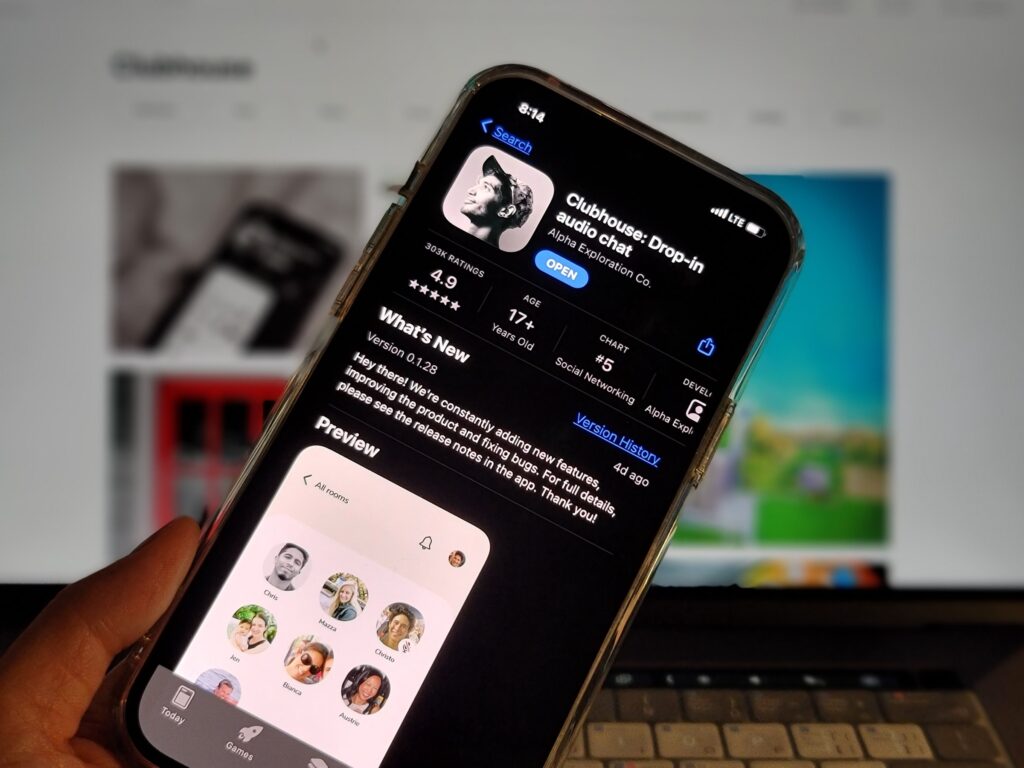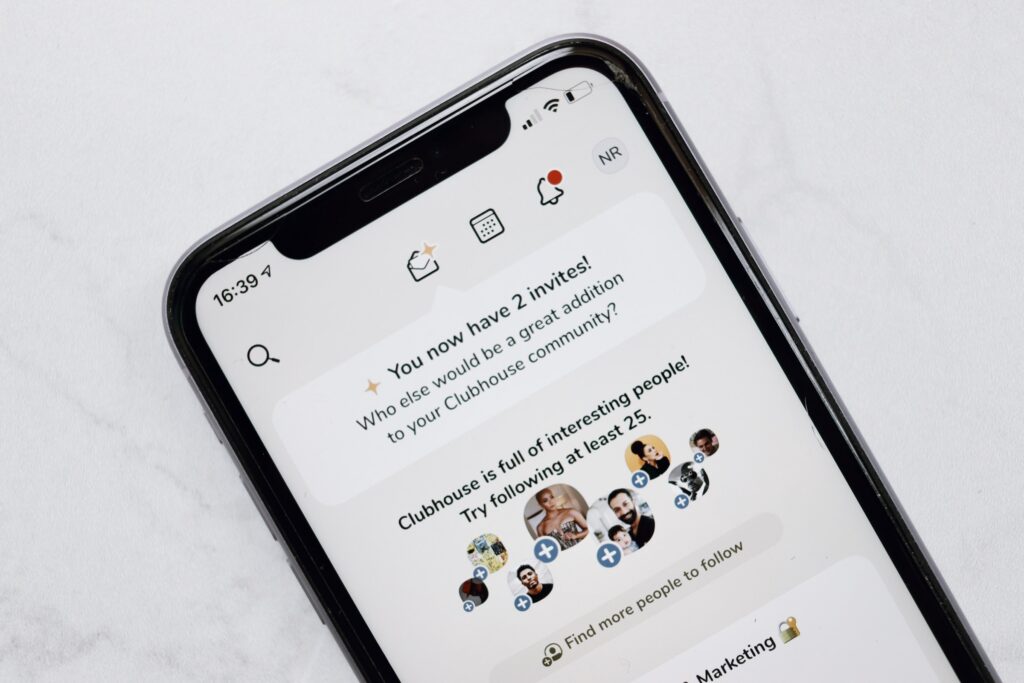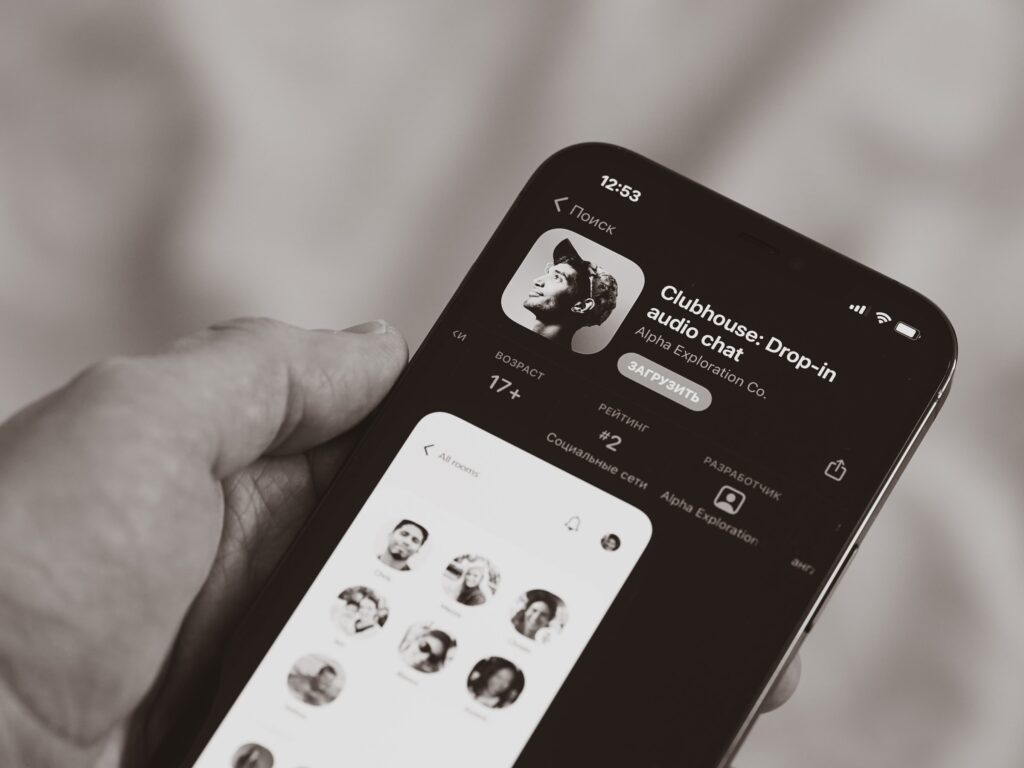Wondering why you hear a lot about Clubhouse lately? Even though the social audio app is only a year old, it has already become popular. “Clubhouse” is based on the concept of live audio-only interaction, which allows users to broadcast their live chats and receive live audience reactions. Instead of a single material stream, users are presented with a variety of “rooms” to join for live discussions on various topics, where they may either listen or contribute. Clubhouse’s success may be due mainly to its core format, live audio, an underutilized genre on social media. The attractiveness of this format is primarily due to two factors: first, it lowers the barrier to content creation and consumption, and second, it recaptures the spontaneity that is typically found in offline interactions.
There is something for everyone on Clubhouse, with rooms dedicated to pop culture, cricket, music, gaming, and even religion and prayer. The initially invitation-only social audio app has taken hold worldwide, with users of all ages, backgrounds, interests, and even languages coming together to talk about anything and everything, including things the government would prefer people avoid.

Lowering the content generation entrance barrier is a beautiful approach to bringing in more people, particularly those too busy to commit to a regular content schedule. Clubhouse has been dubbed “Medium for podcasts” since it allows people to speak up anytime they want without feeling obligated to do so. With numerous high-profile IT sector executives and celebrities joining in recent months, the app’s content providers have become more diverse. Holding a room with thousands of people in attendance is an art, and moderators frequently need to set and reset the agenda as individuals come and go. This also explains why Clubhouse’s founders opted to give moderators so much power, as they can invite other users to speak. If the conversation is going in the wrong direction, the moderator can silence and remove other speakers.
Clubhouse has attracted millions of new users since its launch on Android on May 21. However, opinions about Clubhouse’s future are divided. Will it join Facebook, Instagram, and Twitter in the big leagues, where hate speech and other issues that come with scale at least somewhat offset their entrenchment in users’ social habits?
Because it is an audio-only format, it is a good choice for ambient consumption, similar to the kind of comfort TV that some people use as background noise while multitasking. Of course, practically all audio formats offer this kind of flexibility, but Clubhouse stands apart from the likes of podcasts and radio because of the live spontaneity and participation it provides. Audio apps have the advantage of being able to run in the background. It eliminates the need to stare at a screen all the time. This feature is especially true in Clubhouse, where the audio from the Room you are in continues to play even if you are using another app.
Clubhouse will face the same, if not more significant, issues as other social media platforms in terms of misinformation, hate speech, and harmful content. Currently, Clubhouse’s content filtering is an afterthought, which could harm the app in the long run. The company would be wise to invest in artificial intelligence and algorithms to detect hate speech, and it could perhaps start tackling the particular difficulty of moderating harassment and hate speech via live spoken conversation in earnest.
Local Perspective
Sri Lankans are adopting Clubhouse and inventing entirely new models. Aside from the tech and startup talks that initially defined the platform, weekend music performances and heated political debates have come to define it in recent years. People are turning to the internet and platforms such as Clubhouse due to the lockdown, as actual physical discussions have become difficult due to the pandemic.
I am looking forward to seeing what creators from throughout Sri Lanka have to offer. As usual, there is much noise and phoney experts that have entered the platform to promote obsolete and false information. I believe that over time, this will go through a natural selection process. Rooms hosted by clubs such as”Grow with Mayanna” and “eLearning.lk” will remain in the long run based solely on the quality of content they provide to the audience. People, I believe, are currently finding this out themselves. The audience is slowly but steadily migrating into rooms that provide actual value to their GBs and time.
The app’s greatest strength is its ability to work in any language. While the physical interface is primarily in English, the audio format eliminates any language hurdles while speaking. This makes it possible for almost anyone to discuss with little to no obstacles to entering.
Local creators would have to put in the extra effort to maintain audience engagement and have them tune in regularly. Even creators who have traditionally done well on video-driven platforms such as YouTube and Instagram are now flocking to the site in droves.
Show me the money?

With a valuation of over $1 billion, Clubhouse expects to make money from tips, ticketed events, and paid subscriptions. Room attendance and time spent are likely to be significant measures for creators and businesses trying to cash in on Clubhouse involvement, unlike other social platforms that offer engagement metrics like “likes,” “comments,” and “shares.” However, that does not imply that the app’s reach cannot be quantified and used as the primary metric.
Social media and monetization go hand in hand in today’s digital economy. Already people are charging users to be a part of rooms. Brands and content providers can use this app to develop their community and indirectly sell their products or services. Content makers could charge to promote items or services in a specific room. People may host live events that sponsors could fund, such as a concert or a stand-up comedy act.
Clubhouse will need further to embed itself in the existing social media environment as it scales and begins to monetize its content—consider how easy it is to watch TikTok videos outside of the app. Clubhouse already allows us to link our Twitter and Instagram accounts, and it will undoubtedly add features like recording and live chat. With hundreds of conversations taking place on the app simultaneously, Clubhouse’s recommendation engine is in desperate need of improvement. Currently, I believe this is the most significant area that needs improvement.
Competitors

Clubhouse has unquestionably carved out a space for itself. The clock, however, is ticking. Clubhouse has a tiny window to recruit new users before the social audio function, like Stories or short video content, becomes democratized.
Twitter debuted Twitter Spaces, a comparable service for accounts with more than 600 followers, in May. Facebook launched Live Audio Rooms in the United States. Spotify’s Greenroom is a competitor, while LinkedIn is also exploring a social audio experience. Clubhouse risks being drowned out by a Goliath with a massive base of loyal users, similar to how FourSquare became obsolete once larger apps integrated location tagging into their services.
- Written by: Mohenesh Chamith Buthgumwa
- Posted on: August 14, 2021
- Tags: audio, Clubhouse, Clubhouse sri lanka, Digital, digital marketing sri lanka, elearning.lk, Greenroom, Grow with Mayanna, Live Audio Rooms, podcast, rooms, spaces, sri lanka, Twitter